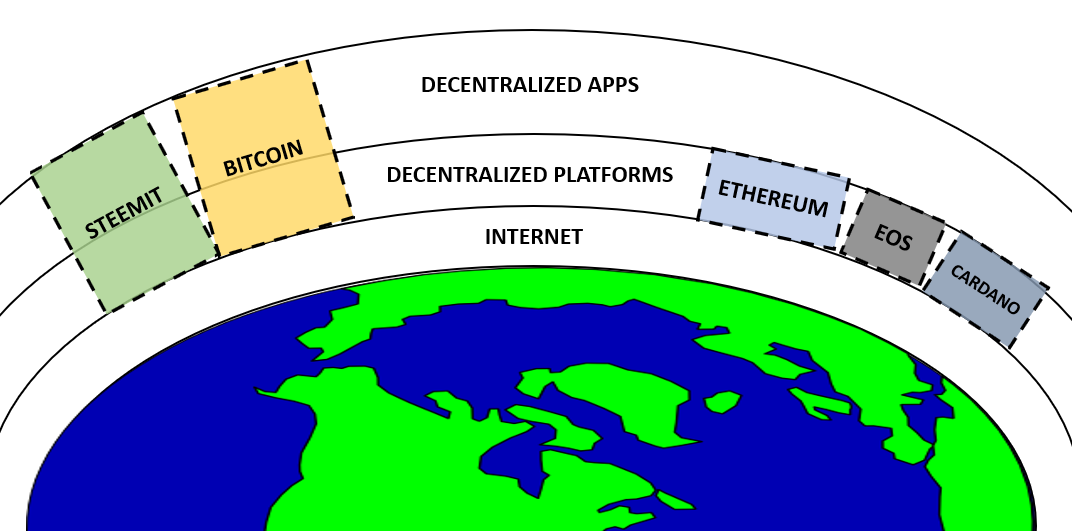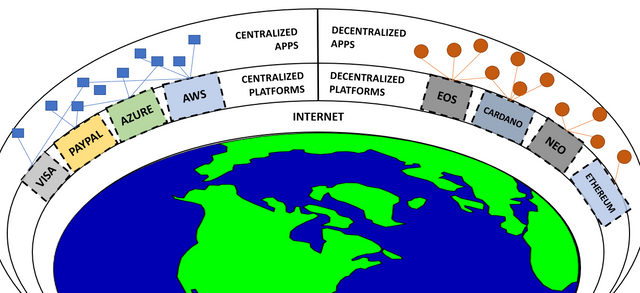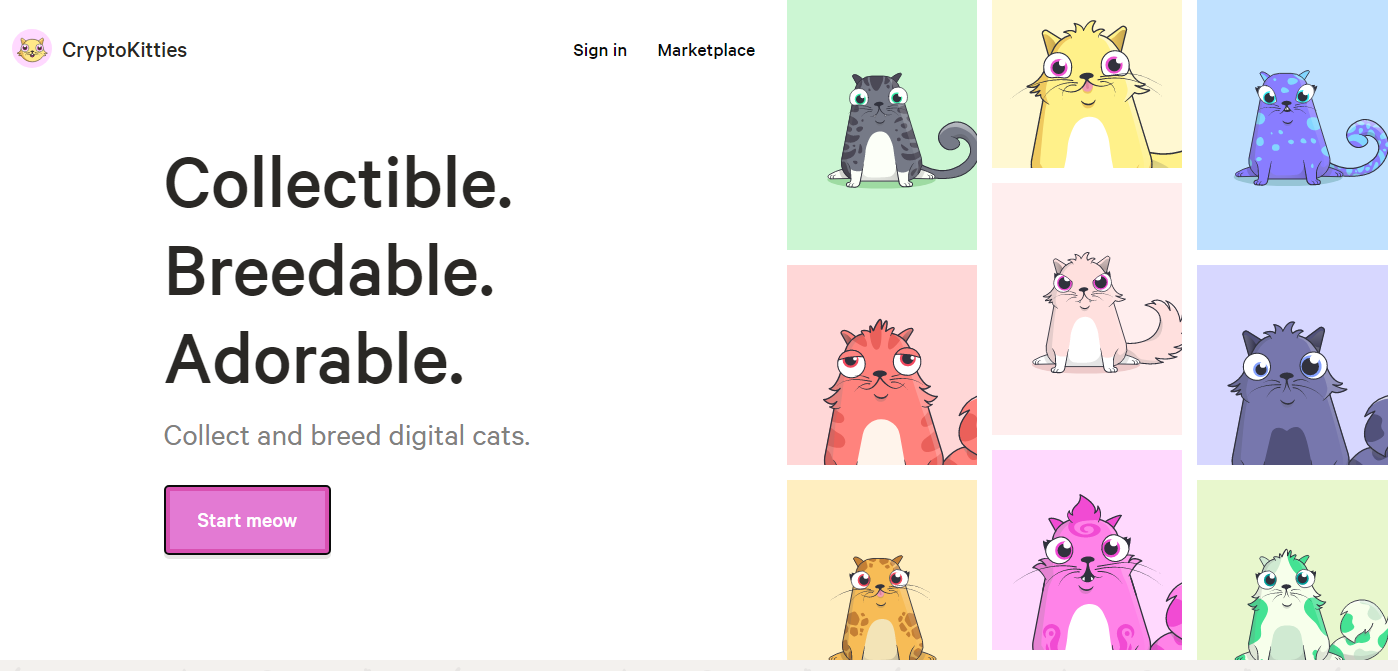2018: The year decentralized platforms battle it out for the heart of the web
There's an extremely exciting battle underway in the world of blockchain technologies.
What's happening is so huge that those in the know compare this to 1995 when the internet was just gaining adoption. The internet is a fitting analogy because of the potential impact this will have on the world, but also because of the current level of understanding by the general population. The internet was not very accessible in 1995 and very few people understood it. The blockchain layer currently being built on top of the internet is in a similar state today.
In recent conversations with family and friends, I hear common themes when discussing Bitcoin. They regret not getting in sooner, but now feel that it's too late. They've missed the big move and now it's a bubble that's going to pop.
My response to them is that they're not understanding the broader picture. The blockchain technology upon which Bitcoin is built is still in its early stages. And Bitcoin, in hindsight, has it's flaws. What's currently happening is a whole new class of blockchains are under development that have the advantage of looking at Bitcoin's flaws and fixing them. This means blockchains of the future will be more scalable, performant, and have built-in governance so that the community can make decisions on enhancements and functionality without hard forking.
But, the other difference is that with Bitcoin, the code for the application (the currency) is tightly intertwined with the code for the platform (the blockchain and miners). This new generation of blockchains have decoupled the application from the platform. In this way, the new blockchains are general purpose platforms. You could build a currency on top of them like a Bitcoin, or you could build a social network on top of them like a Steemit. You could also build an email app, a ride sharing app, a music player, a voting system, or a stock exchange.

This generation of blockchains can be compared to AWS (Amazon Web Services). AWS has come to dominate the web hosting / cloud computing market over the last few years. If you want to build a web application for example and don't want to maintain your own servers, you can use Amazon's servers and just pay for what you need.
The downside of using a company like Amazon to host your application is that centralized applications are not as secure, and you are at risk of privacy violations or censorship. Think Edward Snowden. Platforms like AWS also do not have a built in mechanism to transfer value from one user to another the way Bitcoin does. When hosting on Amazon, you are still reliant on another third party like Visa or Paypal to handle payment processing.
Blockchains take out the middleman. It is like another layer of the internet is being built that offers all the functionality that AWS and Visa offer today. Why build an app that requires you to put trust in one of these centralized corporations when you could build on top of an open, decentralized protocol?
It is almost as if the internet was left unfinished, and because of this we needed web hosting and payment processing middlemen to fill in the gaps. But once this new layer of the internet is complete, developers will prefer to build on these new open protocols. Just as Linux has come to dominate the operating system of web servers, the new generation of blockchain technologies will dominate the platform layer of the internet.

The top contenders for the decentralized platforms are EOS, Cardano, NEO, Shift, and Substratum. This market is so huge that each of these may find its own niche and survive the test of time, but my guess is that a subset will emerge as the dominant players by the end of 2018.
Now, it wouldn't be fair to discuss all of this without mentioning Ethereum. Ethereum is a very successful blockchain, second only to Bitcoin. It was the first of the decentralized platforms and paved the way for this next generation of blockchains listed above. The problem with Ethereum is that it followed many of Bitcoin's design patterns (such as the Proof of Work consensus algorithm) and therefore inherited many of Bitcoin's flaws. It is slow and consumes a vast amount of electricity. A single app, a game called CryptoKitties, has recently been bringing the Ethereum network to its knees.

Also like Bitcoin, Ethereum does not have a governance process built into the blockchain. This means that the Ethereum community does not have a good way to make enhancements to their protocol without hard forking (or splitting Ethereum into two separate blockchains, one with the enhancement and one without). Thus Ethereum and Ethereum Classic. This leads to the community putting a tremendous amount of weight on Vitalik Buterin's opinion, putting into question how decentralized Ethereum really is.
If Ethereum can work through these issues quickly, it can potentially maintain it's spot as king of the decentralized platforms. Otherwise it will be shoved to the side by the newer technologies, used only for minor niches like hosting ICOs.
Here are the websites for each of these decentralized platforms. Most have whitepapers if you want to research them further:
You will see that each of these platforms differs in how blocks are produced, how the blockchain is governed, how tokens play into the system, the services they offer, and the size and strength of the development community. All these projects appear to have good intentions and deserve our support. It will be incredibly fascinating to see how this plays out. The web is going to look much different a decade from now, and much of that is being determined by the battle that is currently unfolding.
Very well written! It's exactly what I'm trying to explain people around me 😀
Congratulations @pelling, you have decided to take the next big step with your first post! The Steem Network Team wishes you a great time among this awesome community.
The proven road to boost your personal success in this amazing Steem Network
Do you already know that awesome content will get great profits by following these simple steps, that have been worked out by experts?
Congratulations @pelling! You have completed some achievement on Steemit and have been rewarded with new badge(s) :
Click on any badge to view your own Board of Honor on SteemitBoard.
For more information about SteemitBoard, click here
If you no longer want to receive notifications, reply to this comment with the word
STOP2018 will be the Year of the DAG.
Congratulations @pelling! You received a personal award!
Click here to view your Board of Honor
Congratulations @pelling! You received a personal award!
You can view your badges on your Steem Board and compare to others on the Steem Ranking
Vote for @Steemitboard as a witness to get one more award and increased upvotes!